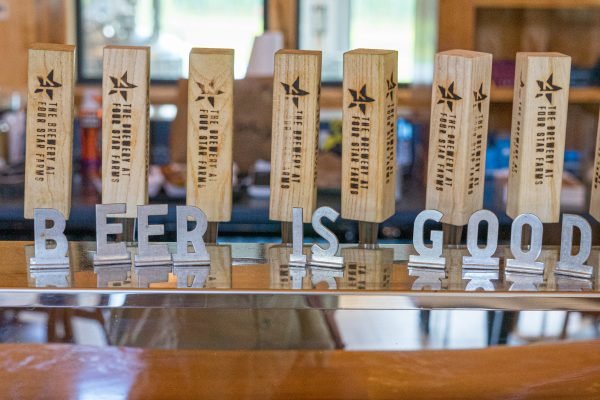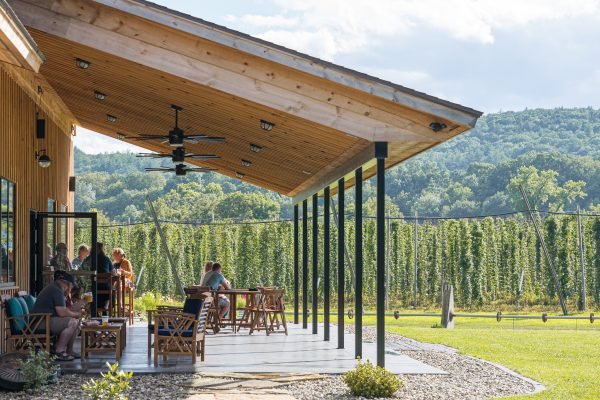Valley Bounty: Four Star Brewery
Published June 25, 2022 in the Daily Hampshire Gazette
By Lisa Goodrich
Imagine holding the relaxation of a beautiful summer day in the palm of your hand. If you’re lucky enough to live in the Pioneer Valley, you get to taste that moment with a trip to The Brewery at Four Star Farms in Northfield.
By growing their own hops and grains, this farm cultivates roots in this special place to impart unique characteristics to their beers. Beermaking combines science, art, and intuition. Brewer and co-owner, Chris Sellers, shares his wide knowledge of the brewing process and enthusiasm for watching ingredients grow before his eyes.
Four Star Farms grows its own hops, and barley, wheat, and rye for beermaking and sale to other brewers. To prepare grains for brewing, this team sends their grains to a maltster in Maine. One special beer, the brewery’s Saison, is brewed entirely with grains grown right in Northfield.
 All the hops used in Four Star Farms’ beers are grown on the farm. Since 2008, the farm has grown nine varieties of the rhizome on 17 acres. The farm cultivates more varieties to test for future crops that may present different characteristics to the beer. Hop vines are called “bines,” and they grow vertically, winding around support cables that reach 8-10 feet above the soil. As the plant reaches 15-25 feet, it grows sidearms, which bear the hop cones. At Four Star Farms, the vine grows on a cable in the hopyard. The growing season is late April to August. Sellers shares, “It’s a difficult climate to grow hops in. It takes a certain farming fortitude to put up with New England weather.” Hops are cut to the ground for harvest beginning in August, then come back every year.
All the hops used in Four Star Farms’ beers are grown on the farm. Since 2008, the farm has grown nine varieties of the rhizome on 17 acres. The farm cultivates more varieties to test for future crops that may present different characteristics to the beer. Hop vines are called “bines,” and they grow vertically, winding around support cables that reach 8-10 feet above the soil. As the plant reaches 15-25 feet, it grows sidearms, which bear the hop cones. At Four Star Farms, the vine grows on a cable in the hopyard. The growing season is late April to August. Sellers shares, “It’s a difficult climate to grow hops in. It takes a certain farming fortitude to put up with New England weather.” Hops are cut to the ground for harvest beginning in August, then come back every year.
Water plays a critical part in brewing. At 95% of beer’s volume, the mineral content of water can change the finished characteristics of beer. Four Star Farms uses well water from next to the brewery. Sellers explains, “It’s really exciting to use water that’s right here on the farm that is actually fantastic for brewing.”
Once the brewer receives the malted grains back from the maltster, the malted grains are milled, and hot water is added to make a mash. This process breaks down and caramelizes sugars in the boiling process. After this, hops are added to balance bitterness. Fermentation follows, where the yeast used determines the length of time the beer ferments. Sellers notes, “It’s funny: some of the most widely consumed beers in the world also take the longest time to make.”
The final step is packaging. Sellers explains, “Cans have really taken off as the preferred package format for beer in the last five years. It’s a more sustainable package for beer.” Aluminum cans ship more efficiently, which results in lower fuel consumption and carbon emissions from trucking.
Sellers shares that labeling inspired deeper reflection of the farm, the brewery, and their products. He explains, “We asked ourselves, what is it about this place that we want to share with people? We realized we kept coming back to the idea of this place. There’s nowhere else like this where you can sit and drink a beer with this kind of view. There are very few places in the valley with this kind of wide-open space.”
They teamed up with Little Pond Digital in Brattleboro and posed the question, “Is there a way to express this place on a beer can?” Photographer Rebecca Lotka turned to drone photos. Sellers shares, “The images on cans show what we’re excited about, even if you’re somewhere else holding that can in your hand.” Sellers contends, “The agriculture makes an interesting photograph, based on the visual geometry. Whether large scale farm photos or close-ups, the shapes, textures, and colors of the hopyard are interesting.”
Four Star Brewery beers stand out in a field of strong competition. Sellers comments, “The important thing is you’re tasting the unique characteristics of the ingredients grown right here. For instance, Spring Mending Pale Ale features heavily our Cascade Hops, and that has a beautiful, citrus floral characteristic to it from the hops.”
 Sellers welcomes visitors in any season, “In good weather, pick out a beer, sit outside on an Adirondack chair, and enjoy the sounds and space. Look down the hop rows. It’s visually stunning, regardless of season, with the hills in the background. If it’s cooler or raining, we have our tap room. Maybe 80% of the wood in our tap room interior, tables and bar, is made from wood harvested on our farm, so you can experience all the characteristics of the place, even if the weather is a bit inclement.”
Sellers welcomes visitors in any season, “In good weather, pick out a beer, sit outside on an Adirondack chair, and enjoy the sounds and space. Look down the hop rows. It’s visually stunning, regardless of season, with the hills in the background. If it’s cooler or raining, we have our tap room. Maybe 80% of the wood in our tap room interior, tables and bar, is made from wood harvested on our farm, so you can experience all the characteristics of the place, even if the weather is a bit inclement.”
The brewery has a farm winery license as well. They produce their own hard cider with apples from Scott’s Farm in Dummerston, Vermont. They offer both red and white wines produced for them by Black Birch Vineyard, poured on draft.
Sellers enjoys introducing their hops to other brewers across the state and promoting Pioneer Valley-grown ingredients. “Even though we sell a lot of hops to other breweries, it’s surprising how few brewers use locally-grown ingredients. It’s exciting to see brewers get motivated about using different characteristics from these hops in their beers. They’re trying new beers that showcase the characteristics of these hops.”
Sellers reflects that the joy of his vocation is tied to the place: “Tangibly seeing my work in front of me is extraordinary. It’s a treat for me, to go out and see these ingredients growing. I appreciate the hops because I’ve seen how much work went into growing them.”
If you go, The Brewery at Four Star Farms is located at 508 Pine Meadow Road in Northfield. They are open Thursday to Sunday and offer indoor and outdoor seating. Picnics are welcome, and a food truck is available on site. Check website for hours. No pets or outside alcohol, please. Cash/credit/debit accepted.
Lisa Goodrich is communications coordinator for CISA (Community Involved in Sustaining Agriculture). To learn more about local farms, what’s in season, and where to find it, visit buylocalfood.org/find-it-locally.

